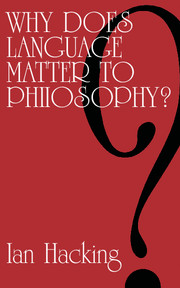13 - Why does language matter to philosophy?
Published online by Cambridge University Press: 05 November 2012
Summary
The dozen philosophers who have been made to play their parts upon our stage would all answer this question in different ways. There are lots of reasons why language has mattered to philosophy, and the reasons have doubtless been different in the several eras of philosophical speculation. Sometimes concern with language has obsessed philosophers to the point where deep matters were too little touched upon. In other periods failure to reflect at length upon the nature of language has perhaps done harm. No one can doubt that language has mattered to many philosophers. I have chosen my topics with a particular tradition in mind, and within that tradition I have allowed free play for my own tastes. Even so we have had a good gamut of traditional Great Problems: truth, reality, existence, logic, knowledge, necessity, dreams, ideas. Another choice, even within the same tradition, might have given us chapters on God, freedom, morality, induction, intention. Had we used a quite different kind of net, we should have pulled in plenty of philosophico-linguistic reflection on society, history, consciousness, action, and Man.
Aside from what, in the opening chapter of strategy, I called the minor reasons why language has persistently mattered to philosophers, there need not be any true and interesting general answer to my question. Indeed, I am sure that no such answer is valid over the whole domain of Western philosophizing from Plato to the present.
- Type
- Chapter
- Information
- Why Does Language Matter to Philosophy? , pp. 157 - 187Publisher: Cambridge University PressPrint publication year: 1975



